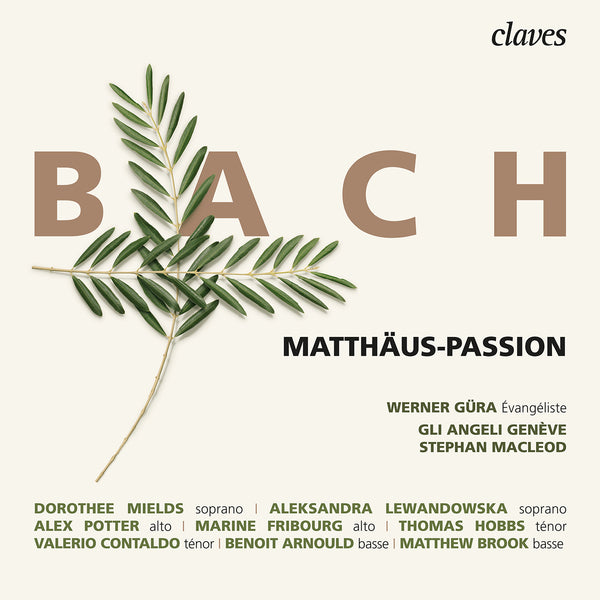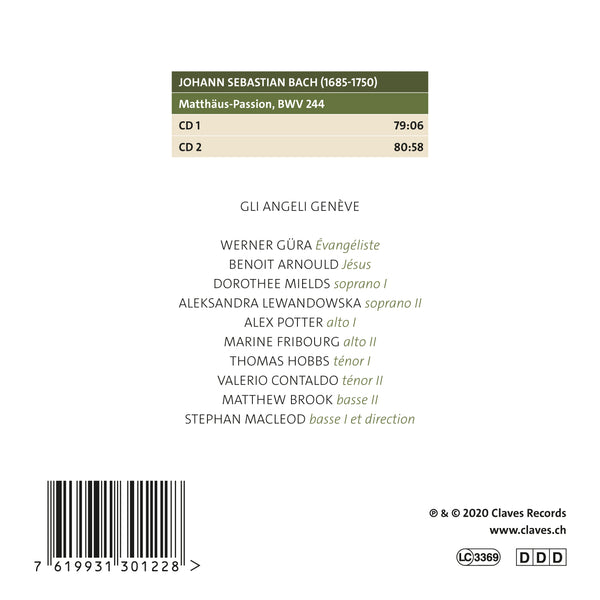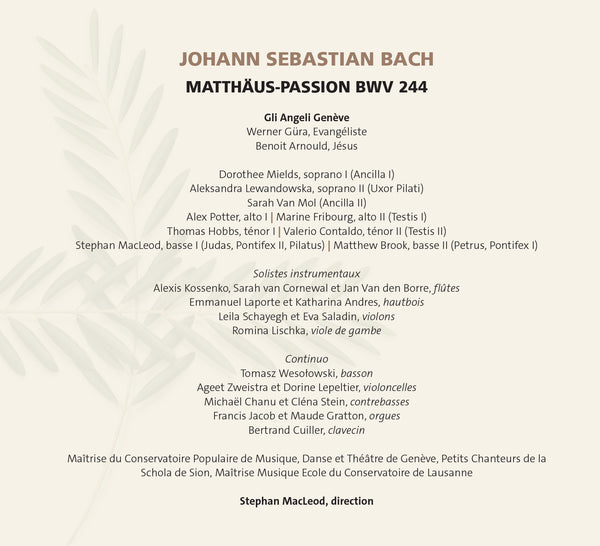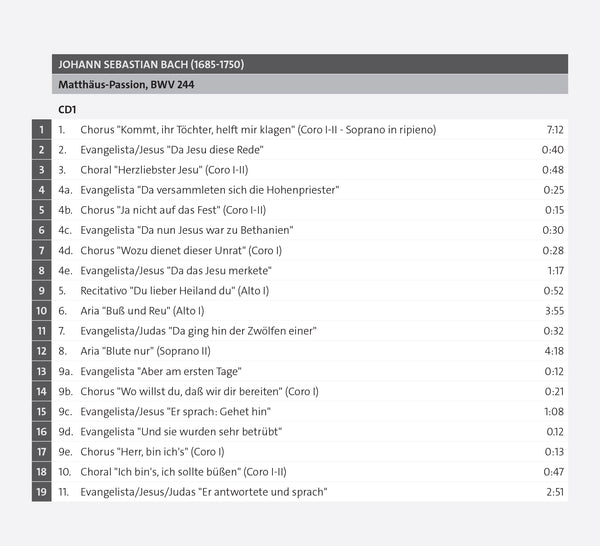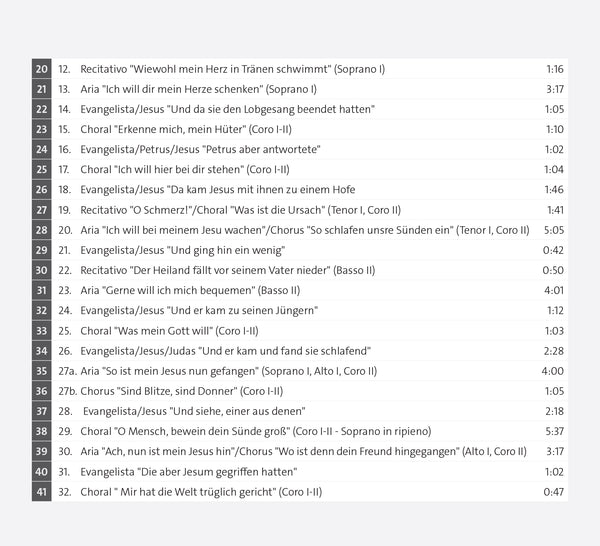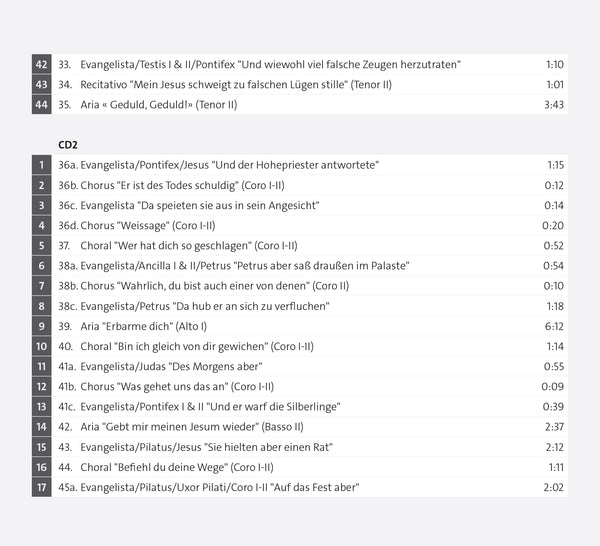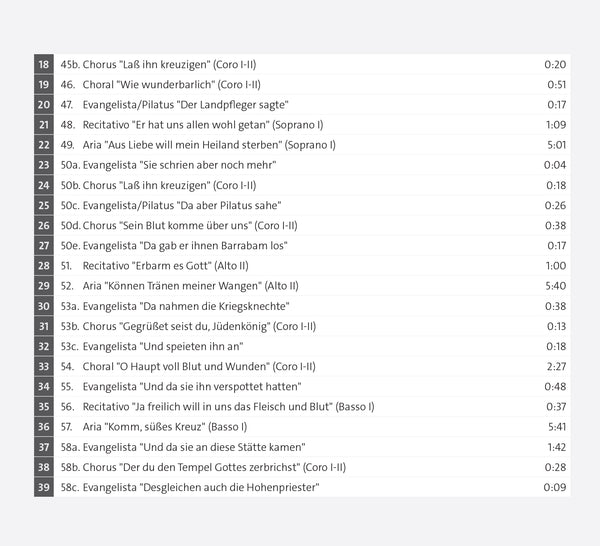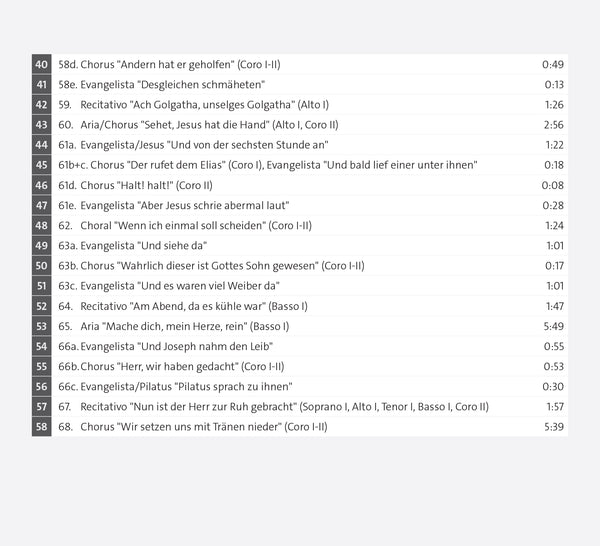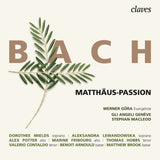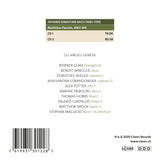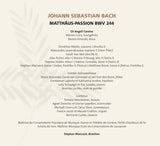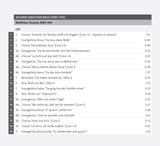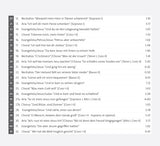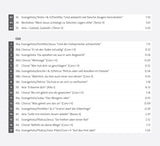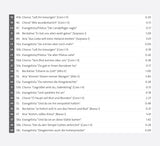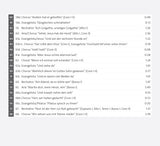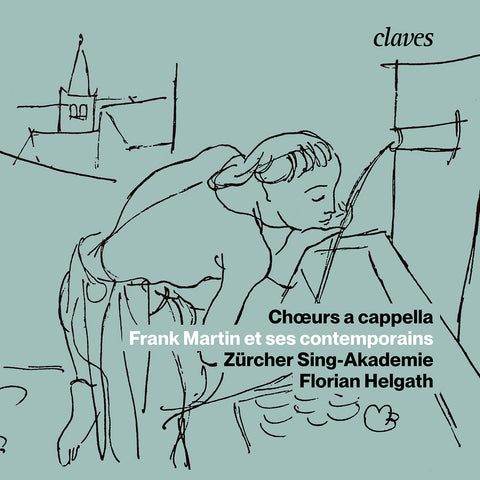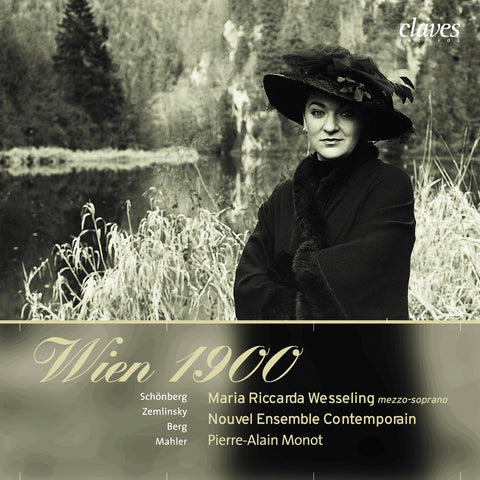(2020) Bach: Matthäus-Passion
Catégorie(s): Musique ancienne Chant lyrique
Instrument(s): Flûte Clavecin Orgue Alto
Voix: Alto Soprano Ténor
Compositeur principal: Johann Sebastian Bach
Ensemble: Gli Angeli Genève
Chef: Stephan MacLeod
Nb CD(s): 2
N° de catalogue:
CD 3012/13
Sortie: 27.03.2020
EAN/UPC: 7619931301228
Cet album est en repressage. Précommandez-le dès maintenant à un prix spécial.
CHF 24.00
Cet album n'est plus disponible en CD.
Cet album n'est pas encore sorti. Précommandez-le dès maintenant.
CHF 24.00
Cet album n'est plus disponible en CD.
CHF 24.00
TVA incluse pour la Suisse et l'UE
Frais de port offerts
Cet album n'est plus disponible en CD.
TVA incluse pour la Suisse et l'UE
Frais de port offerts
Cet album est en repressage. Précommandez-le dès maintenant à un prix spécial.
CHF 24.00
Cet album n'est plus disponible en CD.
This album has not been released yet.
Pre-order it at a special price now.
CHF 24.00
Cet album n'est plus disponible en CD.
CHF 24.00
Cet album n'est plus disponible en CD.
BACH: MATTHÄUS-PASSION
This recording was made in April 2019 at the Ernest-Ansermet Studio in Geneva, after five concerts in Switzerland during the preceding days. The desire to be as faithful as possible to the rhythm of the drama of the Passion and to the evidence of the musical sequences, which is easier to feel during a live performance than in front of the relative abstraction of the microphones, as well as a non-negligible time constraint (three and a half days in the studio for a work of 160 minutes), pushed us to record long takes, sometimes including up to 10 or 12 minutes of music, thus getting as close as possible to the feeling of a concert.
In concert, with small vocal groups, Gli Angeli Genève systematically places the singers in front of the instruments regardless of repertoire, so as to give speech in music the most prominent place possible. When recording, since the audience’s crucial role cannot be replaced by the microphones, we place ourselves in a large circle, all facing each other. We can see each other playing, singing, vibrating, breathing and reacting. The idea of reaction is central to this work where, when the action of the story is suspended, it is immediately replaced by emotion and poetic as well as musical beauty that Matthew’s story inspired in Bach and Picander. Airs as well as chorales. And within our circle we can react together, engage in dialogue, and see ourselves feel the drama and powerful affects that mark the work relentlessly. And then we can share the pleasure and sometimes the awe - so beautiful is the music – of being able to live all this together.
Forming a circle to make this music and observing the extraordinary musicians of Gli Angeli Genève at work led me to realise the extent to which The Saint Matthew Passion has structured the career and relationship to music of many of us. Virtually all of us have discovered and “learned” it with conductors and in readings that gave us the most beautiful keys to its understanding, which we in turn were able to refine in the course of our respective experiences with it, experiences that for the not so young among us already represent hundreds of concerts. Being together during those few days in April to testify to our love for this work and what it demands of us, evoked and still evokes to me a magnificent record by Astor Piazzolla that I had bought during my studies and that I listened to over and over again at the time. A text in the CD booklet had struck me almost as much as his music: Piazzolla had written poignantly that this recording, for him and his musicians, existed “so that their grandchildren would know who they were”. Of course, Piazzolla was writing his own music whereas we would be incapable of writing but 10 bars of Bach, but the recording you are holding in your hands is also to say who we are, what we are fortunate enough to do in life, and that there are few pleasures in this world equal to making this very music with friends.
***
Gli Angeli Geneva
Gli Angeli Geneva was founded in 2005 by Stephan MacLeod. A formation of varying size, playing on period instruments (or copies thereof), the ensemble is made up of musicians who have careers in the field of baroque music, but who are not only active in this field: they do not play solely early music. Their eclecticism guarantees the vitality of their enthusiasm. It is also a driving force behind their curiosity.
Right from the beginning of a musical adventure that for several years concentrated solely on live performances of the complete Bach Cantatas in Geneva, with three concerts per season, Gli Angeli Genève has been the setting for encounters between some of the most famous singers and instrumentalists of the international baroque scene and young graduates of the High Schools of Music of Basel, Lyon, Lausanne and Geneva.
Internationally acclaimed since the release in 2009 and 2010 of its first two CDs, which won numerous critical awards, the ensemble now gives seven or eight concerts per season in Geneva, as part of its Complete Bach Cantatas on the one hand, a series of annual concerts at the Victoria Hall on the other, and since September 2017 in a new complete series dedicated to Haydn’s Symphonies. The ensemble is equally in demand in Switzerland and abroad for performances not only of Bach, but also Tallis, Josquin, Schein, Schütz, Johann Christoph Bach, Weckmann, Buxtehude, Rosenmüller, Haydn, Mozart and others. In recent seasons, Gli Angeli Genève has been in residence at the Utrecht Festival and the Thüringer Bachwochen, and has also performed in Basel, Zurich, Lucerne, Barcelona, Nürnberg, Bremen, Stuttgart, Brussels, Milan, Wroclaw, Paris, Ottawa, Vancouver, Amsterdam and The Hague. Gli Angeli Genève is a regular guest at the Festival de Saintes, Utrecht festival, the Musikfest in Bremen or the Bach Festival in Vancouver. The ensemble made its debut in 2017 at the Grand Théâtre in Geneva and in 2019 at the KKL in Lucerne.
Gli Angeli Genève’s latest recording for Claves, Sacred Music of the 17th century in Wroclaw, won the ICMA prize for best vocal baroque music recording of the year in 2019.
Find this album here:
***
Distribution
Gli Angeli Genève
Werner Güra, Evangéliste
Benoit Arnould, Jésus
Dorothee Mields, soprano I (Ancilla I)
Aleksandra Lewandowska, soprano II (Uxor Pilati)
Sarah Van Mol (Ancilla II)
Alex Potter, alto I | Marine Fribourg, alto II (Testis I)
Thomas Hobbs, ténor I | Valério Contaldo, ténor II (Testis II)
Stephan MacLeod, basse I (Judas, Pontifex II, Pilatus) | Matthew Brook, basse II (Petrus, Pontifex I)
Solistes instrumentaux
Alexis Kossenko, Sarah van Cornewal et Jan Van den Borre, flûtes
Emmanuel Laporte et Katharina Andres, hautbois
Leila Schayegh et Eva Saladin, violons
Romina Lischka, viole de gambe
Continuo
Tomasz Wesołowski, basson
Ageet Zweistra et Dorine Lepeltier, violoncelles
Michaël Chanu et Cléna Stein, contrebasses
Francis Jacob et Maude Gratton, orgues
Bertrand Cuiller, clavecin
Maîtrise du Conservatoire Populaire de Musique, Danse et Théâtre de Genève, Petits Chanteurs de la Schola de Sion, Maîtrise Musique Ecole du Conservatoire de Lausanne
Stephan MacLeod, direction
This recording was made in April 2019 at the Ernest-Ansermet Studio in Geneva, after five concerts in Switzerland during the preceding days. The desire to be as faithful as possible to the rhythm of the drama of the Passion and to the evidence of the musical sequences, which is easier to feel during a live performance than in front of the relative abstraction of the microphones, as well as a non-negligible time constraint (three and a half days in the studio for a work of 160 minutes), pushed us to record long takes, sometimes including up to 10 or 12 minutes of music, thus getting as close as possible to the feeling of a concert.
In concert, with small vocal groups, Gli Angeli Genève systematically places the singers in front of the instruments regardless of repertoire, so as to give speech in music the most prominent place possible. When recording, since the audience’s crucial role cannot be replaced by the microphones, we place ourselves in a large circle, all facing each other. We can see each other playing, singing, vibrating, breathing and reacting. The idea of reaction is central to this work where, when the action of the story is suspended, it is immediately replaced by emotion and poetic as well as musical beauty that Matthew’s story inspired in Bach and Picander. Airs as well as chorales. And within our circle we can react together, engage in dialogue, and see ourselves feel the drama and powerful affects that mark the work relentlessly. And then we can share the pleasure and sometimes the awe - so beautiful is the music – of being able to live all this together.
Forming a circle to make this music and observing the extraordinary musicians of Gli Angeli Genève at work led me to realise the extent to which The Saint Matthew Passion has structured the career and relationship to music of many of us. Virtually all of us have discovered and “learned” it with conductors and in readings that gave us the most beautiful keys to its understanding, which we in turn were able to refine in the course of our respective experiences with it, experiences that for the not so young among us already represent hundreds of concerts. Being together during those few days in April to testify to our love for this work and what it demands of us, evoked and still evokes to me a magnificent record by Astor Piazzolla that I had bought during my studies and that I listened to over and over again at the time. A text in the CD booklet had struck me almost as much as his music: Piazzolla had written poignantly that this recording, for him and his musicians, existed “so that their grandchildren would know who they were”. Of course, Piazzolla was writing his own music whereas we would be incapable of writing but 10 bars of Bach, but the recording you are holding in your hands is also to say who we are, what we are fortunate enough to do in life, and that there are few pleasures in this world equal to making this very music with friends.
***
Gli Angeli Geneva
Gli Angeli Geneva was founded in 2005 by Stephan MacLeod. A formation of varying size, playing on period instruments (or copies thereof), the ensemble is made up of musicians who have careers in the field of baroque music, but who are not only active in this field: they do not play solely early music. Their eclecticism guarantees the vitality of their enthusiasm. It is also a driving force behind their curiosity.
Right from the beginning of a musical adventure that for several years concentrated solely on live performances of the complete Bach Cantatas in Geneva, with three concerts per season, Gli Angeli Genève has been the setting for encounters between some of the most famous singers and instrumentalists of the international baroque scene and young graduates of the High Schools of Music of Basel, Lyon, Lausanne and Geneva.
Internationally acclaimed since the release in 2009 and 2010 of its first two CDs, which won numerous critical awards, the ensemble now gives seven or eight concerts per season in Geneva, as part of its Complete Bach Cantatas on the one hand, a series of annual concerts at the Victoria Hall on the other, and since September 2017 in a new complete series dedicated to Haydn’s Symphonies. The ensemble is equally in demand in Switzerland and abroad for performances not only of Bach, but also Tallis, Josquin, Schein, Schütz, Johann Christoph Bach, Weckmann, Buxtehude, Rosenmüller, Haydn, Mozart and others. In recent seasons, Gli Angeli Genève has been in residence at the Utrecht Festival and the Thüringer Bachwochen, and has also performed in Basel, Zurich, Lucerne, Barcelona, Nürnberg, Bremen, Stuttgart, Brussels, Milan, Wroclaw, Paris, Ottawa, Vancouver, Amsterdam and The Hague. Gli Angeli Genève is a regular guest at the Festival de Saintes, Utrecht festival, the Musikfest in Bremen or the Bach Festival in Vancouver. The ensemble made its debut in 2017 at the Grand Théâtre in Geneva and in 2019 at the KKL in Lucerne.
Gli Angeli Genève’s latest recording for Claves, Sacred Music of the 17th century in Wroclaw, won the ICMA prize for best vocal baroque music recording of the year in 2019.
Find this album here:
***
Distribution
Gli Angeli Genève
Werner Güra, Evangéliste
Benoit Arnould, Jésus
Dorothee Mields, soprano I (Ancilla I)
Aleksandra Lewandowska, soprano II (Uxor Pilati)
Sarah Van Mol (Ancilla II)
Alex Potter, alto I | Marine Fribourg, alto II (Testis I)
Thomas Hobbs, ténor I | Valério Contaldo, ténor II (Testis II)
Stephan MacLeod, basse I (Judas, Pontifex II, Pilatus) | Matthew Brook, basse II (Petrus, Pontifex I)
Solistes instrumentaux
Alexis Kossenko, Sarah van Cornewal et Jan Van den Borre, flûtes
Emmanuel Laporte et Katharina Andres, hautbois
Leila Schayegh et Eva Saladin, violons
Romina Lischka, viole de gambe
Continuo
Tomasz Wesołowski, basson
Ageet Zweistra et Dorine Lepeltier, violoncelles
Michaël Chanu et Cléna Stein, contrebasses
Francis Jacob et Maude Gratton, orgues
Bertrand Cuiller, clavecin
Maîtrise du Conservatoire Populaire de Musique, Danse et Théâtre de Genève, Petits Chanteurs de la Schola de Sion, Maîtrise Musique Ecole du Conservatoire de Lausanne
Stephan MacLeod, direction
Return to the album | Read the booklet | Composer(s): Johann Sebastian Bach | Main Artist: Stephan MacLeod





STUDIO MASTER (AUDIO HAUTE-RÉSOLUTION)
Alto
Alto
Amethys Design
Chant lyrique
Classica - Coup de coeur
Clavecin
Claves picks
En stock
Flûte
Gli Angeli Genève
ICMA 2021 nominees
Johann Sebastian Bach (1685-1750)
Musique ancienne
Musique Haute-résolution - Qualité master studio
Orgue
Scherzo Excepcional
Soprano
Stephan MacLeod
Tous les albums
Ténor
Wener Güra
Alto
Alto
Amethys Design
Chant lyrique
Classica - Coup de coeur
Clavecin
Claves picks
En stock
Flûte
Gli Angeli Genève
ICMA 2021 nominees
Johann Sebastian Bach (1685-1750)
Musique ancienne
Musique Haute-résolution - Qualité master studio
Orgue
Scherzo Excepcional
Soprano
Stephan MacLeod
Tous les albums
Ténor
Wener Güra











